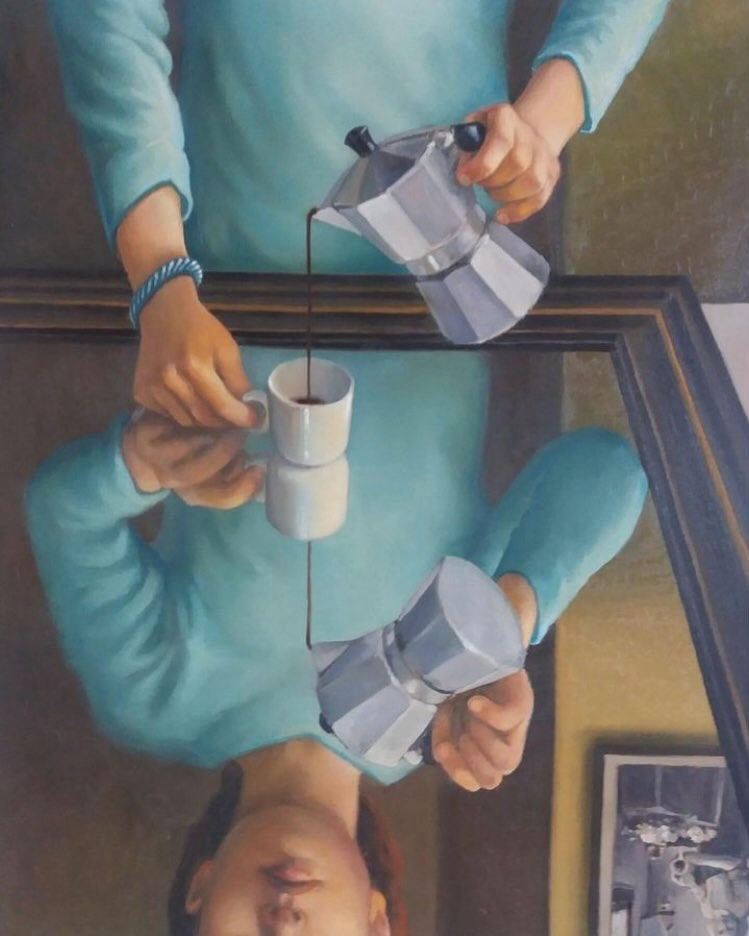I was not looking for anything profound. I was just scrolling. Reddit, half forum and half fever dream, has become an unexpected gallery space in my life. Amid memes, debates, and digital clutter, I occasionally stumble into something that stops me. That is how I found Caffè latte by Carlo Bertocci. There was no headline or context. Just an image of a woman in a blue sweater pouring coffee. Yet something was off in the most compelling way.
The pour defies logic. In the mirror above her, the reflection does not follow the physical rules we expect. The stream of coffee seems to rise—or perhaps fall—the reflection not merely mimicking the act but completing it in its own impossible choreography. I paused and studied the image. I saved it. And now, even days later, I cannot stop thinking about it.
What strikes me now is not just the image itself, but how I encountered it. Not in a curated museum space or printed catalog, but in the unpredictable visual stream of the internet. Increasingly, platforms like Reddit, YouTube, and Instagram have become my points of entry into art. These are not traditional archives, yet they are alive with discovery. My relationship with art has shifted. It is no longer only about seeking; sometimes it is about being found.
Bertocci’s painting reflects that shift. It is quiet, domestic, and intimate. A moka pot. A ceramic cup. Morning light. The setting is ordinary, yet it becomes extraordinary through the subtle defiance of the mirror. The dissonance between the expected and the observed unsettles me. Which act is real? Which version of the woman holds the cup?
I am reminded that the internet itself is a kind of mirror. It reflects and refracts our identities. The woman in Caffè latte might be anyone—someone I know, someone I am, or no one in particular. She stands at the threshold between ritual and mystery. She does something utterly familiar, and yet the moment is transformed.
This makes me think of Jacques Lacan’s theory of the mirror stage, in which the recognition of one’s image marks the beginning of self-awareness, and also a kind of rupture. The reflected self is always slightly other. In Bertocci’s work, that rupture is not a threat. It is an invitation. The mirror is not there to confuse but to deepen our seeing.
Maurice Merleau-Ponty wrote that “the body is our general medium for having a world.” Here, that medium is doubled. The woman’s hand, steady and deliberate, performs a morning habit. But the mirror renders it ambiguous. The body becomes both subject and echo. A private moment becomes philosophical.
Since discovering this painting, I have begun paying more attention to how I engage with art. I no longer see digital discovery as lesser than in-person experience. I see it as different. There is beauty in the randomness of finding art mid-scroll. There is power in the way certain images demand to be saved, revisited, and reflected upon.
Now, when I pour my morning coffee, I notice the rhythm. I watch the way light hits the ceramic. I catch myself in the reflection of a window and wonder—not in fear, but with curiosity—who is pouring? Who is watching?
There may not be an answer. Perhaps the question itself is the point. Between the real and the reflected, the physical and the digital, the self and the image, there is a space where art continues to live. Quietly. Persistently. And if I am attentive, I can meet it there.
